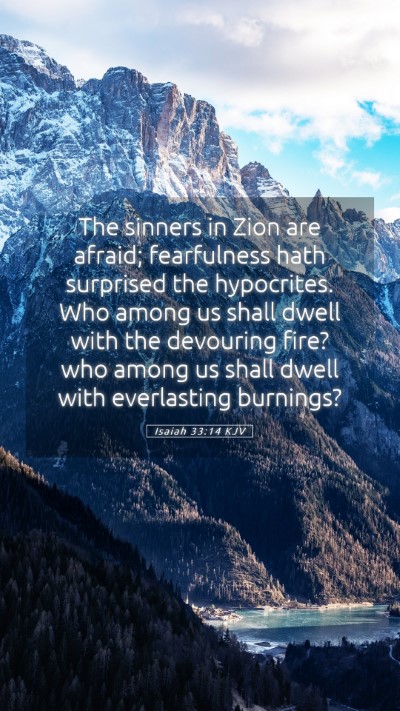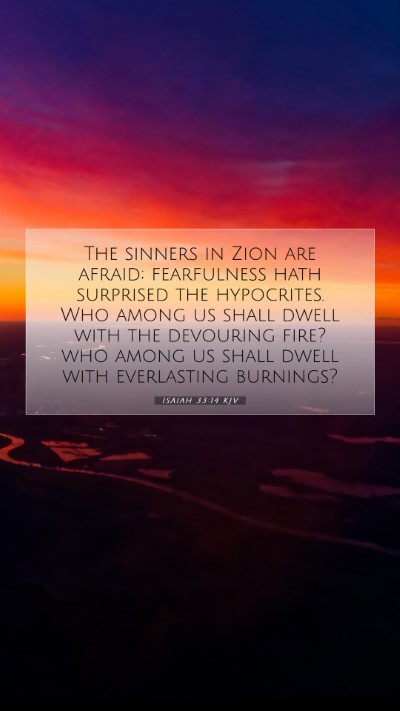Understanding Isaiah 33:14
Bible Verse: Isaiah 33:14 - "The sinners in Zion are afraid; fearfulness hath surprised the hypocrites. Who among us shall dwell with the devouring fire? who among us shall dwell with everlasting burnings?"
Overview of the Verse
This verse captures the profound sense of fear that grips the sinners and hypocrites within Zion — a metaphorical representation of Jerusalem or the people of God. The description of "devouring fire" and "everlasting burnings" evokes vivid imagery of divine judgment and the consequences of sin.
Bible Verse Meanings and Interpretations
The teachings in this verse can be summarized as follows:
- Recognition of Sin: The first step toward understanding this scripture is recognizing the fear and terror that sin brings upon individuals. Sinners in Zion, despite being among God's chosen, face fear because of their unrepentant nature.
- Hypocrisy: Isaiah highlights that even those who wore the facade of righteousness (the hypocrites) are not exempt from the fear of judgment. This teaches a lesson about the importance of sincerity in faith.
- Divine Judgment: The "devouring fire" is a powerful symbol of God's judgment. The imagery not only reflects the intensity of God's holiness but also serves as a warning to those who take their relationship with God lightly.
- Questioning Worthiness: The rhetorical questions posed in this verse challenge the listener to consider who is worthy to stand before God’s judgment and endure His holiness. This questions the concept of human righteousness versus divine holiness.
Bible Study Insights from Commentaries
Insights from renowned commentaries deepen our understanding:
Matthew Henry’s Commentary
Henry emphasizes the alarm that sin brings over those who are aware of God’s holiness. He notes that the fear described is a reality that not only shakes the unrepentant but also serves as a mechanism for awakening them to their spiritual state. The fear of judgment is intended to lead individuals toward repentance and a genuine relationship with God.
Albert Barnes’ Notes on the Bible
Barnes highlights that this verse serves to illustrate the dreadful consequences of hypocrisy. He asserts that the idea of residing with devouring fire pertains to the ultimate realization of the fate of the wicked. He encourages readers to reflect upon their spiritual condition and recognize the importance of sincere faith devoid of hypocrisy.
Adam Clarke’s Commentary
Clarke provides a historical context, explaining the nature of judgment in the time of Isaiah. He discusses the implications of this judgment as not just physical destruction but also spiritual separation from God. Clarke emphasizes the mercy available to repentant hearts who seek righteousness instead of deception.
Significance of the Verse
This verse is significant as it addresses both personal accountability and the collective condition of a community. It calls believers to assess their hearts and urges a return to true worship and holiness. It verifies that God’s judgment is certain for sinners while underscoring His immense mercy for those who genuinely repent.
Application of Isaiah 33:14
In applying this passage to daily life, individuals are encouraged to:
- Self-Examine: Regularly evaluate their spiritual lives for signs of hypocrisy and unrepentant sin.
- Seek Righteousness: Pursue a genuine relationship with God, acknowledging His holiness and striving to align their lives with His Word.
- Embrace Grace: Understand that while judgment awaits the unrepentant, God offers grace through repentance.
Related Bible Cross References
- Isaiah 1:28 - "And the destruction of the transgressors and of the sinners shall be together, and they that forsake the Lord shall be consumed."
- Hebrews 12:29 - "For our God is a consuming fire."
- Malachi 3:2 - "But who may abide the day of his coming? and who shall stand when he appeareth? for he is like a refiner's fire and like fuller’s soap."
Conclusion
The exploration of Isaiah 33:14 reveals deep truths about the nature of sin, judgment, and the pursuit of holiness. By contemplating the meanings behind this verse, individuals can foster a better understanding of biblical principles and apply them to their lives, enhancing their Bible study groups and personal spiritual journeys.


